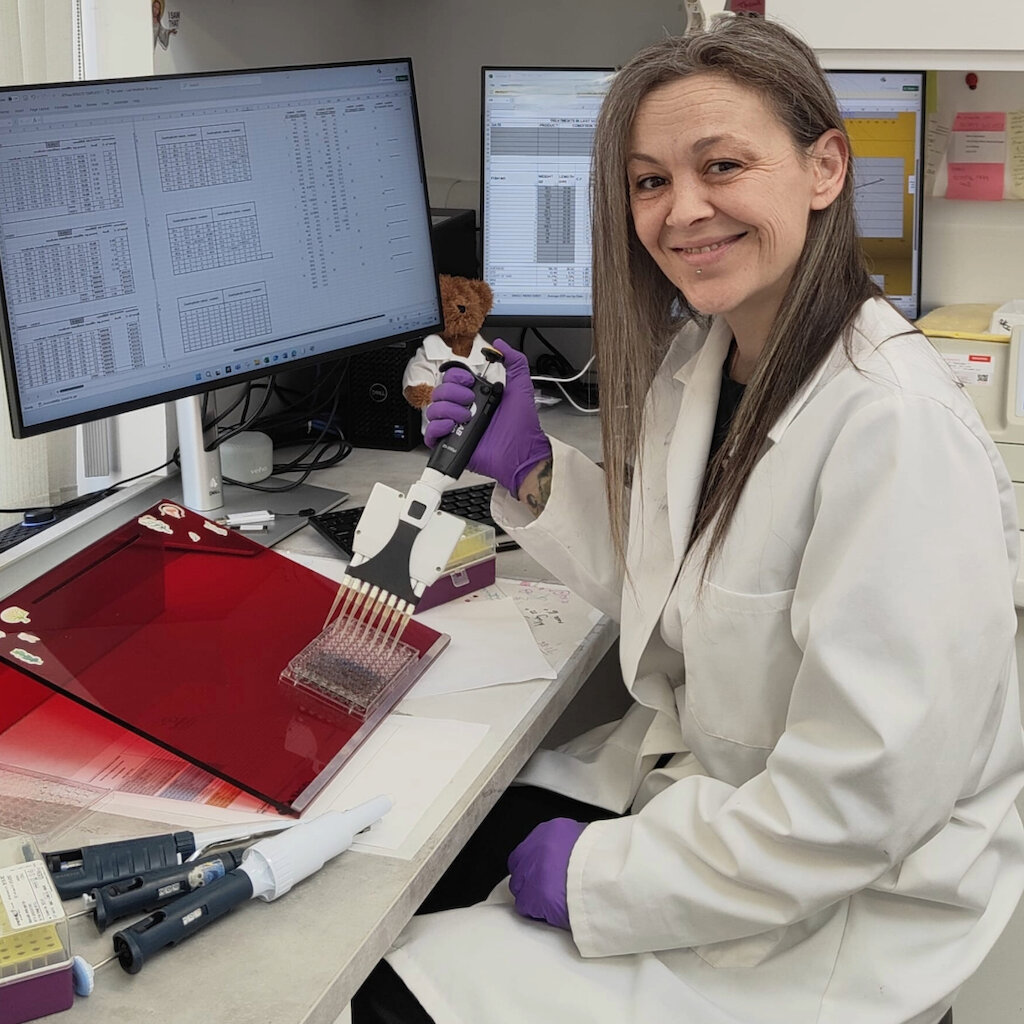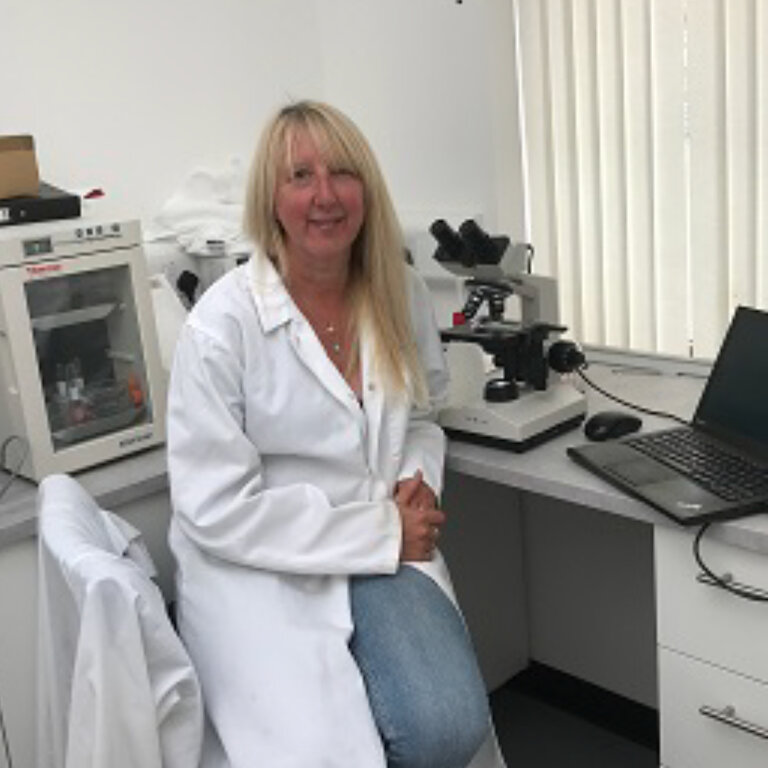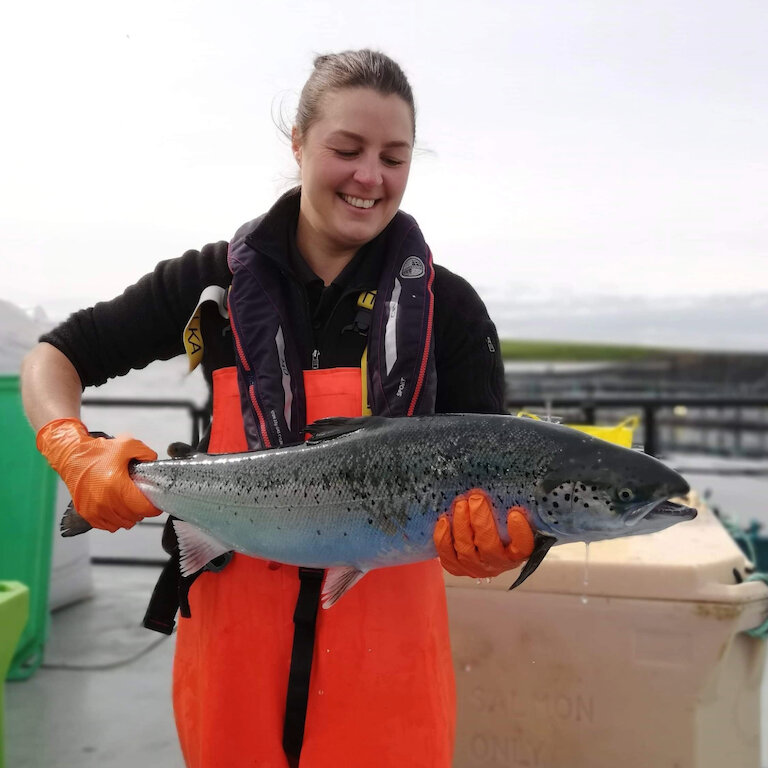We spoke with Debra Brennan (Health & Quality Laboratory Manager, Mowi Scotland), Tori Purfit (Senior Lab Technician, Mowi Scotland), and Ola Wands (Fish Health Manager, Cooke Scotland). They shared their experiences, insights, and the importance of inspiring more women and girls to pursue careers in science.
Today is the International Day of Women and Girls in Science, recognising the vital role of gender equality in scientific progress and global development.
Can you tell us about your role and what a typical day looks like for you?
Debra:
The Role of Health & Quality Laboratory Manager is a dynamic one, no two days are the same. The Quality Laboratory predominantly processes samples from the factory and ensures that the salmon are free from pathogens and are safe for the consumer. The Health Laboratory covers PCR testing for fish disease & testing smolts to see if they are ready for transfer from the hatcheries or freshwater sites to seawater. We also process samples for external testing for medicine residues, and support the farms with phytoplankton and jellyfish sampling, identification, training and mitigation.
Tori:
A typical day for me involves logging incoming samples, then running PCR’s looking for specific fish pathogens. I report any positive results to our vets, health team and farm managers so they can decide on appropriate treatments. I also coordinate all 40+ farms medicine residue testing. As our freshwater salmon grow and begin the smoltification process, I use an enzyme assay to test batches of fish from each loch & hatching site to ensure they are ready to go to sea.
Ola:
I started as a Fish Health Coordinator in 2010, and progressed from there. Some of the typical duties are participating in production and treatment planning, coordinating with the health team to schedule visits and sampling, ordering medicines and vaccines, ensuring fish health documents are up to date for audits.
What inspired you to pursue a career in science and aquaculture?
Debra:
I’ve always had an interest in the ecology and natural environment. My degree is in Natural Science with Environmental Science and my master’s degree is in Marine Molecular biology. Prior to working for Mowi I spent 16 years in a Phytoplankton technical research role. Looking down the microscope at a water sample you enter a whole new world of microscopic marine diversity.
Tori:
I got my first aquarium when I was 5 & it ignited a lifelong passion for fish. Learning about water chemistry in order to keep pet fish became a transferrable skill as an adult and the natural path for me was aquaculture. After many years farming, my focus on fish welfare led me to join the health team where I’m now the senior lab technician for Mowi Fish Health Team.
Ola:
I studied Marine Biology and Freshwater Biology at university and have always had an interest in fish and marine life.
What do you enjoy most about your role?
Debra:
Visiting all our farms that are spread across the West coast of Scotland from Campbeltown to Ullapool and out to both the inner and Outer Hebrides is a real privilege. Working to keep the health and welfare of the fish in this pristine environment with all the challenges that brings is both demanding and rewarding.
Tori:
I work with a brilliant team, in an industry that I’m passionate about. The daily job itself is busy and interesting.
Ola:
The best part is the people, I feel very lucky to have such great working relationships. Seeing fish looking great at harvest that you had first seen 2+ years ago as eggs. That makes you very proud of all the work our teams have put in.
What are the biggest challenges you face in your role, and how do you navigate them?
Debra:
The biggest challenges I have include:
Balancing the management of the 2 in house labs, combined we process over 60,000 samples per year. Having a good team and providing ongoing training with the latest methods and keeping staff motivated is important to the smooth running of the lab.
Ensuring all the farms send in samples in the correct way and at the correct time for analysis, having a good rapport with farm staff, and being there for support.
When the water quality at the farms is challenged by phytoplankton or jellyfish blooms- being a point of contact for advice on identification and mitigation to all the farms whenever needed.
Tori:
The biggest challenge for me is the admin side of lab work. While paperwork & computing is not something I excel at, it’s a vital part of the job. However I always have support and training.
What skills or qualities do you think are most important for success in this field?
Debra:
One of the most important skills is to be prepared that what you thought you had planned to do at a certain time or day nearly always changes due to staff, weather, environmental challenges etc- flexibility and adaptability are key to success.
Tori:
I think to really thrive in any field you need to have a genuine interest. It makes the difference between just having a job and really thriving in your career. Aquaculture is so varied there’s something for everyone.
Ola:
You need to have all the skills a good manager would have, communication, organisation, leadership, etc. However, most importantly is a real passion for the fish that we are rearing.
What advice would you give to women looking to build a career in aquaculture or laboratory science?
Debra:
Historically Fish farming was considered a ‘man’s world ‘but that has changed now and many of my colleagues are women. In both the wider health team and the lab, women equal or outnumber the men. So don’t be put off a career in aquaculture – gender need not be an issue.
Tori:
I was never keen on working over open water in a seawater site, but I would have become a fish farmer much earlier in my life if I had known about freshwater recirculation hatcheries and land based farming. My advice would be don’t be put off thinking its cold and wet etc. its not always like that! I also think hatcheries are ideal for women as they have a lighter touch and are more nurturing, we are good at raising tiny baby fish.
As for laboratory science I would say don’t be put off if you don’t have exactly the right qualifications on paper. My experience combined with on the job training helped me aspire to the senior lab tech position.
Ola:
Just go for it if it’s something you are interested in or passionate about. Careers in science span across so many different sectors, not just aquaculture. Science pushes things forward and ensures you’re constantly learning, you’ll certainly never be bored in your career.
Are there any initiatives or programmes you’d like to highlight that support women in aquaculture?
Debra:
Mowi WiSA
Tori:
Mowi WiSA
Thank you to Debra, Tori and Ola for answering our questions!




